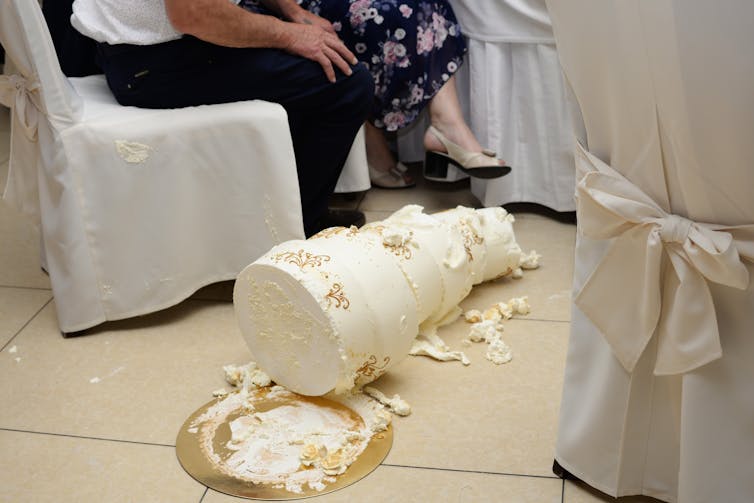Simon Sherry is a Clinical Psychologist and Professor in the Department of Psychology and Neuroscience at Dalhousie University.
We live in the age of perfection. Perfectionism is a personality trait that involves demanding a flawless standard of performance and harshly evaluating ourselves and others. Expectations are so high that something is either flawless or worthless.
Perfectionism rates steadily increased over recent decades, and our culture is now obsessed: the perfect body, job, partner, vacation … the perfect life. We believe others demand more of us and we demand more of others and ourselves.
Nowhere is this more obvious than weddings.
After 25 years researching this topic (and more than 100 publications), I take particular interest in cultural trends that encourage perfectionism — and weddings take the cake.
Pursuing perfection
Most weddings have some common elements: two people, often dressed in some combination of white dress and/or nice suit, exchange vows and rings. But now, in the age of social media and the wedding industry, the wedding must have an esthetic. The reception must be themed, the ceremony colour co-ordinated, and above all: it. must. be. perfect.
Pinterest inspiration boards set the tone and Instagram photos set the standard. Perfection is the tale and social media the teller. Where’s the romance?
Many perfectionists are sensitive to rank, status and dominance in social groups, which drives envy, jealousy and a desire to best others and turns everything into a competition. Weddings are a major milestone that change or reinforce social status; as such, people seek perfection to ridiculous extremes. Minute details are fussed over to the exclusion of what should really matter: the love that brought everyone together in the first place.
How can you have a beautiful, romantic, special day without falling into the trap of relentlessly pursuing perfection? Well, you forget perfection and focus on people.
Pressure from other people
There is immense pressure to plan a party that pleases staid family members and adventurous friends alike. Socially prescribed perfectionism is the belief that society, family and friends have unrealistic expectations of perfection of you.

If your mother is in tears because you’re questioning a religious ceremony, ask yourself these three things:
What are our values? Figure out what you value and translate those values into actions. If you and your partner want to interact with each guest, invite only your nearest and dearest. If you’re environmentally conscious, swap disposable decorations for in-season florals. Are you animal lovers? Ask guests to donate to your choice of charity instead of buying a gift. If you make your wedding a reflection of your values, then you’re less likely to view it as a “failure” if it doesn’t conform to others’ expectations, as perfectionists often do.
What do we want? Striving for perfection is costly. There is pressure to spend on the perfect rings, fancy paper invitations, a tropical honeymoon and more. The wedding industry capitalizes on these expectations, turning weddings into major investments costing an average of $22,000 to $30,000. These “ideals” aren’t feasible for every budget. These are wants, not needs, so allocate your funds where you want them to go. A courthouse wedding, grocery store flowers and a potluck dinner with friends can be just as special. Perfectionists can wrap their esteem and identity up in things, until “junk values” like consumerism dominate. The point is to celebrate, not spend money pleasing others, so don’t feel pressured to go into debt.
How do we grow? Too often, couples fall into the trap of “destiny.” The problem with this “perfect match” mindset is it’s too easy to say “I guess it wasn’t meant to be” when things get tough. Disney movies and romance novels entrenched fairy-tale endings into popular culture, but life doesn’t end with a wedding. Both during and after the wedding, you’ll face challenges and disagreements. If you focus on growing together as you plan your wedding and beyond, you’re less likely to catastrophize — as many perfectionists do — when things (or your partner) aren’t perfect.
Pressure you put on others
You agonize over orchestrating the perfect day, and then your sister’s baby bawls during the ceremony and Uncle Johnny gets drunk and makes rude jokes during the reception. When stakes seem high, you can end up demanding perfection from others, known as other-oriented perfectionism. If they fail to be perfect, that’s when bridezillas, groomzillas or monsters-in-law can emerge.

When something inevitably goes wrong, remember these three things:
Right partner versus right wedding. Weddings are meant to celebrate love. At the end of the day, you go home with your new spouse regardless of whether the wedding meets your expectations. This is just one day of the rest of your lives, so what’s more important? Having the right wedding or having and being the right partner? Focusing on each other, instead of the event, means others’ behaviour won’t feel world-ending because it’s not affecting your relationship.
Focus on relationships. You’ve invited your guests to share in a special moment in your life. Is it then more important that the wedding party looks fit for Vogue or that you have your best friends to support you? Perfectionists don’t play nicely with others because they’re more concerned with others’ performance than the people themselves. For example, a perfectionist might care more about whether their mother’s speech evokes the “right” reactions from the crowd than how she’s feeling about this milestone in your life. If you prioritize your loved ones, the day becomes about connecting with them rather than ensuring they’re playing their part perfectly.
Mistakes are normal. Everyone makes mistakes. Your dad will trip on your train. Your groomsman will make an awkward speech. Your dinner will be late. It happens. If you, like perfectionists, are excessively concerned with making mistakes, then avoiding them monopolizes the event. Breathe and laugh it off.
Pressure you put on yourself
There can be a lot of pressure to look perfect on your wedding day. It’s common for brides to diet, invest in teeth whitening and skin-care regimes before their wedding and hire makeup artists for the event. Grooms may feel pressure to get fitter.
It can be hard to feel confident if you don’t think you meet these expectations, but try to keep these three things in mind:
Perfection is a myth. No one, and nothing, is perfect. There will undoubtedly be “flaws” somewhere. Maybe you stress-sweat. Maybe you stutter during your vows. These are the things you remember fondly. It’s often the “imperfections” that make your memories — and your wedding — perfect. Reminding yourself that perfection is an unrealistic, and even undesirable, standard can keep you from striving for it.
It’s not a competition. You and the couple down the street have very different interests, relationships and values. Their elaborate, 300-guest wedding may have been right for them. They may not understand your desire to have an intimate 50-attendee affair instead, but that doesn’t matter. Both weddings are uniquely beautiful. You want to make memories, not a statement. Despite what perfectionistic thinking might tell you, your wedding isn’t a failure and this isn’t a competition.
You are loved. You might not look like the model did in your gown or suit. That’s OK. Perfectionists are prone to feelings of failure, guilt, shame and low self-esteem because of their harsh self-evaluations and criticisms. However, your partner fell in love with you with the freckles and goofy laugh. You may become more fit or afford a more flattering outfit in the years to come, but that shouldn’t ruin your enjoyment of this moment. You don’t have to be perfect to be loved.
It is, after all, your special day, not your perfect day.![]()
This article is republished from The Conversation under a Creative Commons license. Read the original article.

